Expedia Group Bundle
How Did a Microsoft Experiment Become a Travel Empire?
Journey back to the mid-90s, when the internet was just beginning to reshape how we live, and discover the origins of Expedia Group. From its humble beginnings as a division within Microsoft, this Expedia Group SWOT Analysis reveals the strategic moves that propelled it to the forefront of the travel industry. Explore how Expedia Group, initially a pioneer in the online travel agency (OTA) space, revolutionized the way people plan and book their adventures.
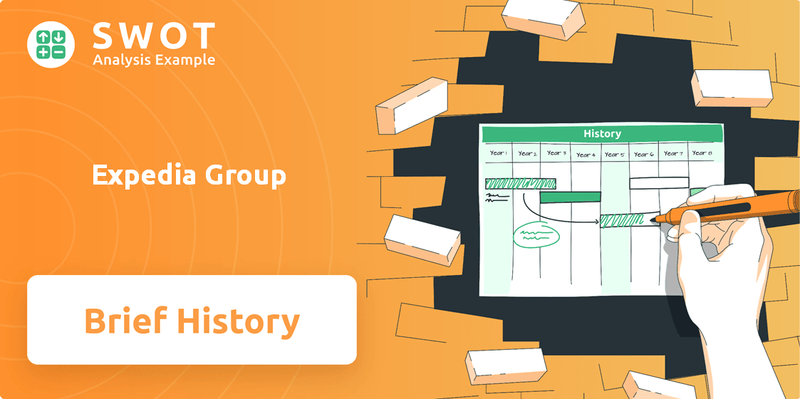
The story of Expedia Group is a compelling narrative of innovation and adaptation within the dynamic travel industry. Understanding the Expedia history is crucial for anyone seeking to grasp the evolution of the online booking platform and its impact on global travel. This brief history of Expedia Group will uncover the key milestones that shaped its trajectory from a Microsoft project to a dominant player, examining its strategic acquisitions and its enduring influence on how we explore the world.
What is the Expedia Group Founding Story?
The story of Expedia Group, a leading force in the travel industry, began on October 27, 1996. This marked the official launch of Expedia.com by Microsoft. The vision was to revolutionize travel booking through an online platform, a concept spearheaded by Rich Barton and Lloyd Frink within Microsoft's Interactive Media Group.
Their goal was to address the inefficiencies of traditional travel agencies. They aimed to create a single online hub for travel information and booking. This would give consumers more control and convenience. Expedia Group quickly became a major player in the Mission, Vision & Core Values of Expedia Group.
The initial business model of Expedia was that of an online travel agency (OTA). It allowed users to search, compare, and book flights, hotels, and rental cars directly. The name 'Expedia' likely combined 'exploration' and 'speed,' reflecting its core offering. Microsoft provided the initial funding, leveraging its resources to build and launch the platform. The founding team's expertise in software development was crucial.
Expedia Group's founding marked a pivotal moment in the history of the travel industry, driven by the vision to transform how people book travel.
- Launched on October 27, 1996, by Microsoft.
- Founded by Rich Barton and Lloyd Frink.
- Focused on solving inefficiencies in travel booking.
- Operated as an online travel agency (OTA).
- Leveraged Microsoft's resources and expertise.
Expedia Group SWOT Analysis
- Complete SWOT Breakdown
- Fully Customizable
- Editable in Excel & Word
- Professional Formatting
- Investor-Ready Format
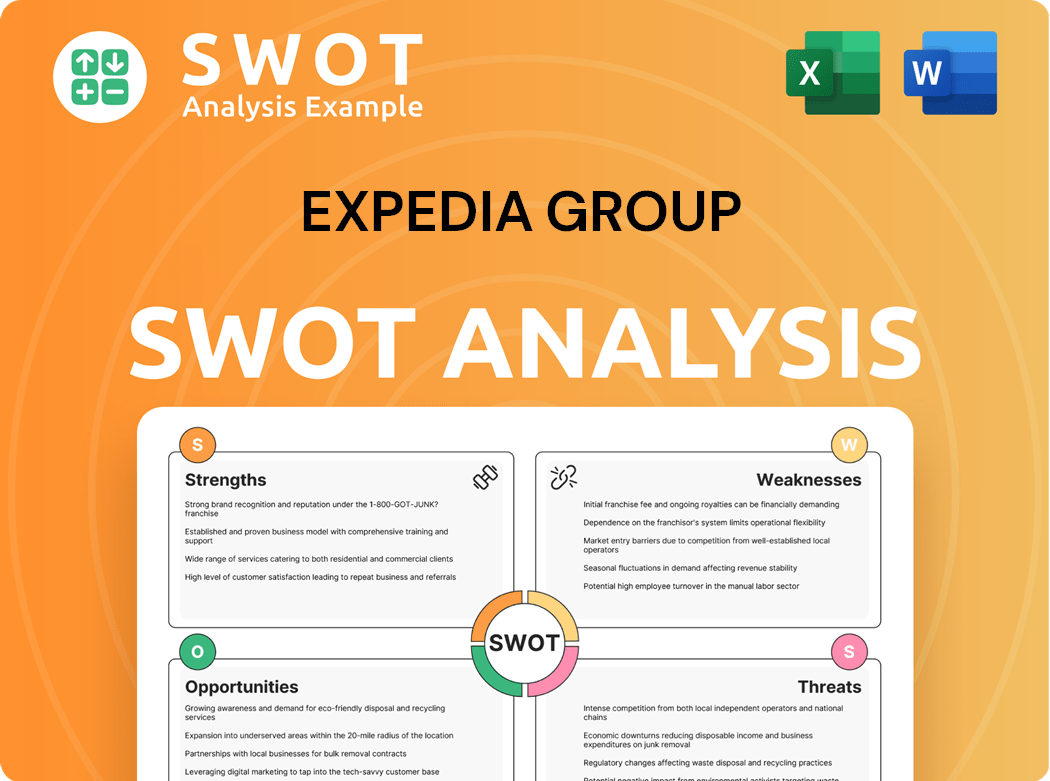
What Drove the Early Growth of Expedia Group?
The early growth of the Expedia Group was characterized by strategic product launches and a deep understanding of the evolving online environment. Following its launch in 1996, Expedia.com expanded its offerings beyond flights to include hotels, car rentals, and vacation packages. This expansion solidified its position as a comprehensive travel portal. The company's early days were marked by significant milestones and strategic decisions that shaped its trajectory in the travel industry.
Initially focusing on flights, the Expedia history showcases a rapid expansion into other travel-related services. By adding hotels, car rentals, and vacation packages, the company quickly evolved into a full-service online travel agency. This diversification was crucial for attracting a broader customer base and increasing revenue streams. This strategy allowed Expedia to capture a larger share of the travel market early on.
A pivotal moment in the Expedia company's early growth was the spin-off from Microsoft in 1999. This strategic move allowed Expedia to operate independently and pursue its own growth strategy. The subsequent IPO provided the company with the necessary capital to fund further expansion and acquisitions. The independent status enabled Expedia to focus solely on the booking platform and its development.
Early team expansion was essential to support its growing user base and product portfolio. The company scaled its engineering, customer service, and sales departments. Geographical expansion followed, with Expedia entering international markets and tailoring its services to local preferences. This global approach helped solidify Expedia's position in the international travel market.
Key acquisitions played a crucial role in Expedia's early growth. The acquisition of Classic Custom Vacations in 2002 enhanced its package holiday offerings. These acquisitions helped Expedia expand its service offerings and market reach. This strategy allowed the company to quickly integrate new services and customer bases.
By the early 2000s, Expedia had established itself as a leading online travel agency, navigating a competitive landscape that included traditional travel agencies and emerging online rivals. Pivotal decisions during this period included focusing on a broad range of travel products and investing heavily in technology to improve user experience and booking efficiency. For more insights into the company's strategic moves, explore the Growth Strategy of Expedia Group. This period saw Expedia transition from a pioneering online venture to a robust, independent entity, setting the stage for future industry consolidation and innovation. In 2024, Expedia's revenue reached approximately $12.8 billion, demonstrating its continued dominance in the travel sector.
Expedia Group PESTLE Analysis
- Covers All 6 PESTLE Categories
- No Research Needed – Save Hours of Work
- Built by Experts, Trusted by Consultants
- Instant Download, Ready to Use
- 100% Editable, Fully Customizable
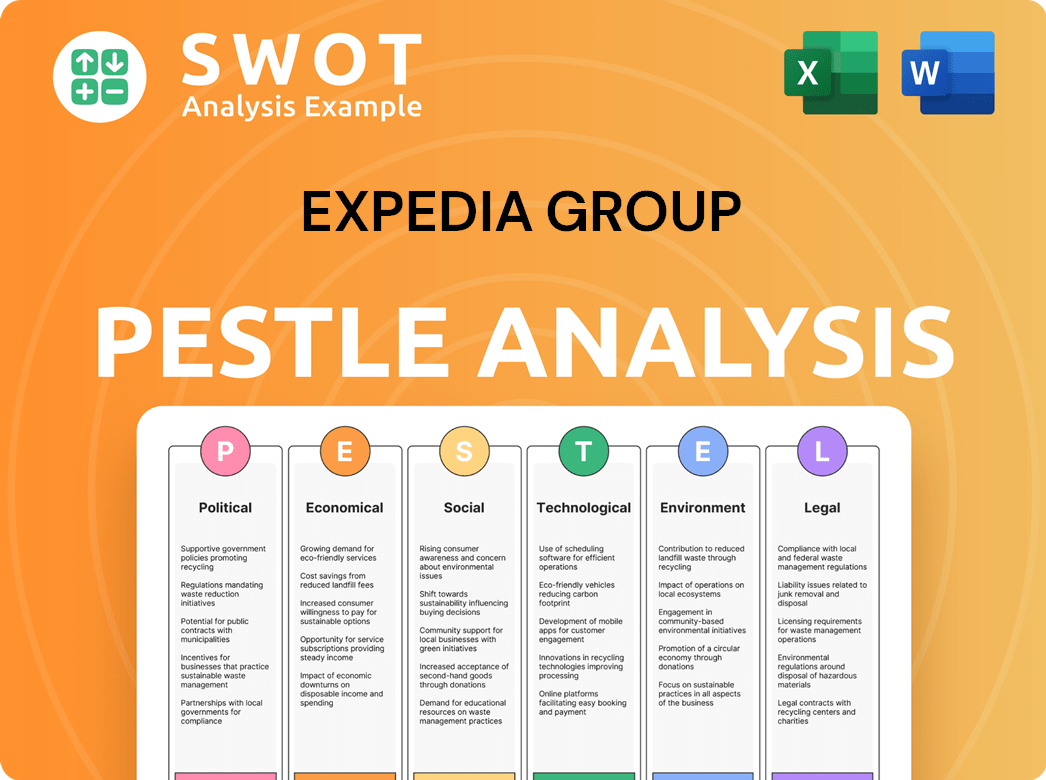
What are the key Milestones in Expedia Group history?
The Expedia Group has a rich history marked by significant milestones that have shaped the online travel agency landscape. From its early days to its current status, the company's journey reflects the evolution of the travel industry and the impact of digital innovation.
| Year | Milestone |
|---|---|
| 1996 | Founded as a division of Microsoft, initially focusing on flight bookings. |
| 1999 | Spun off from Microsoft and became an independent public company. |
| 2001 | Acquired Travelscape.com, expanding its hotel offerings. |
| 2002 | Acquired Hotels.com, significantly increasing its hotel inventory and market presence. |
| 2005 | Acquired Hotwire.com, adding a discount travel site to its portfolio. |
| 2015 | Acquired Orbitz Worldwide, further consolidating its position in the travel industry. |
| 2018 | Officially rebranded as Expedia Group to reflect its expanded portfolio of travel brands. |
| 2024 | Continues to innovate and adapt to changing market dynamics, focusing on technology and customer experience. |
Throughout its history, Expedia Group has been at the forefront of innovation in the travel industry. The company has consistently introduced new features and technologies to enhance the booking experience for its users.
Expedia Group pioneered dynamic packaging, allowing customers to bundle flights, hotels, and other services for customized travel packages. This innovation provided greater flexibility and potential cost savings for travelers.
The integration of user reviews into the booking process revolutionized how travelers made decisions. This feature provided valuable insights and helped build trust with customers.
Expedia Group was an early adopter of mobile booking technology, offering user-friendly apps and mobile websites. This enabled travelers to book and manage their trips on the go.
The company has invested heavily in AI and machine learning to provide personalized travel recommendations. This enhances the user experience and drives bookings.
Through acquisitions and partnerships, Expedia Group has significantly expanded its inventory of hotels, flights, and other travel services. This provides customers with a wider selection and better deals.
Expedia Group continues to invest heavily in technology and AI to improve its platform, enhance the customer experience, and gain a competitive edge. This includes advancements in search algorithms, fraud detection, and customer service.
Despite its successes, Expedia Group has faced numerous challenges throughout its history. These challenges have required the company to adapt and innovate to maintain its position in the competitive travel industry.
The dot-com bubble burst in the early 2000s and the 2008 financial crisis significantly impacted the travel industry. These economic downturns led to decreased travel demand and financial instability for many companies.
Expedia Group faces intense competition from other online travel agencies, metasearch engines, and direct booking channels. This competition puts pressure on pricing and requires continuous innovation to maintain market share.
The rapid advancement of technology has led to new challenges, including the rise of mobile booking and the increasing importance of personalization. The company must continually adapt to these changes to stay relevant.
Expedia Group has undergone several internal restructurings to improve efficiency and streamline operations. These changes can be disruptive and require careful management to minimize negative impacts.
Like all companies, Expedia Group has experienced product failures or features that did not gain traction. Adapting quickly to these issues is crucial for maintaining a competitive edge.
External factors, such as global pandemics, economic downturns, and geopolitical events, can significantly impact the travel industry. Expedia Group must be prepared to respond to these challenges and adapt its strategies accordingly.
Expedia Group Business Model Canvas
- Complete 9-Block Business Model Canvas
- Effortlessly Communicate Your Business Strategy
- Investor-Ready BMC Format
- 100% Editable and Customizable
- Clear and Structured Layout
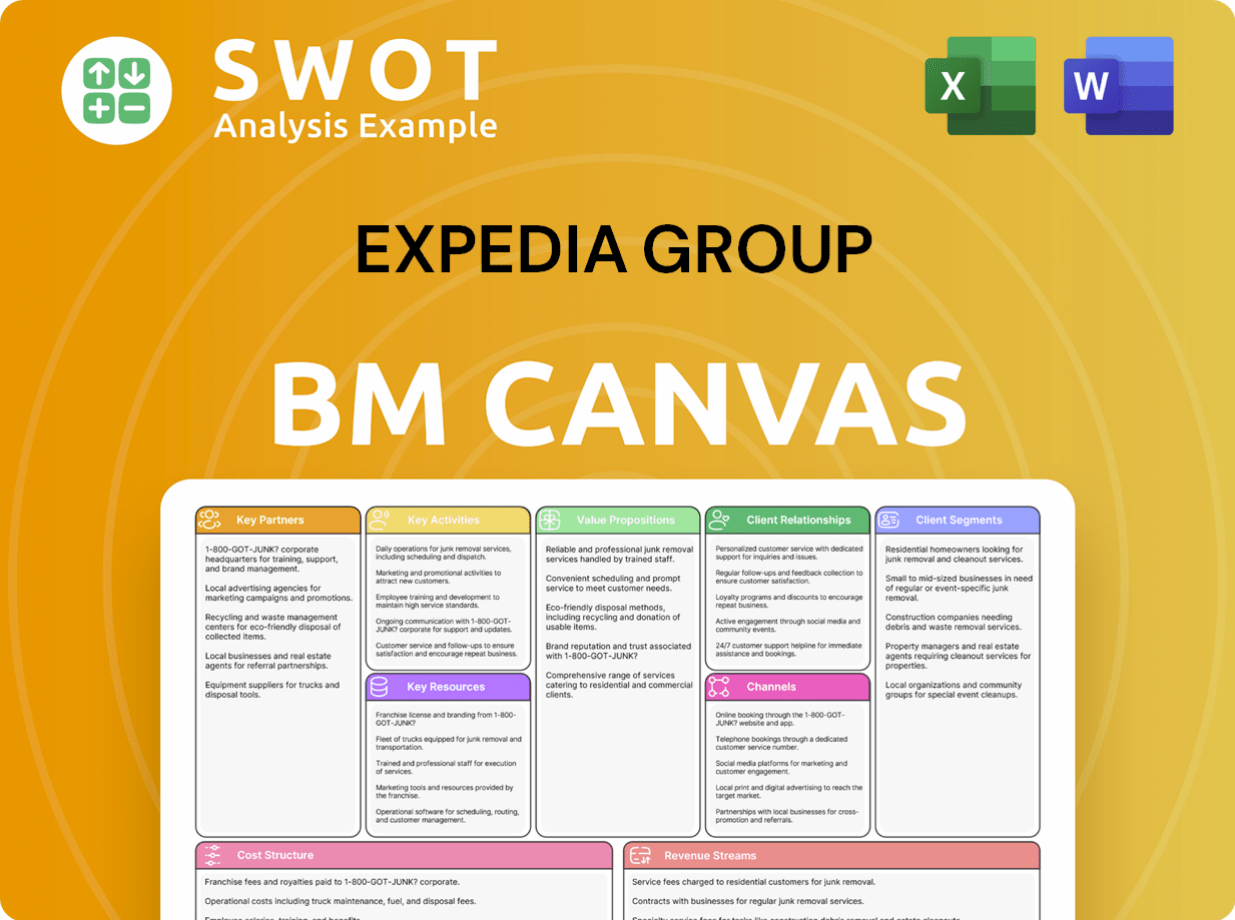
What is the Timeline of Key Events for Expedia Group?
The Expedia Group's journey began in 1996, evolving from a Microsoft venture to a leading online travel agency. Through strategic acquisitions, like Orbitz Worldwide and Travelocity, and a rebranding in 2018, the company solidified its market position. The travel industry's challenges in 2020 led to operational adjustments, but the company rebounded strongly, showing significant growth in 2023 and beyond. The Expedia history reveals a company that has consistently adapted to market changes, leveraging technology to enhance the booking experience.
| Year | Key Event |
|---|---|
| 1996 | Microsoft launches Expedia.com, marking the beginning of the online travel agency. |
| 1999 | Expedia spins off from Microsoft, becoming a publicly traded company. |
| 2002 | Expedia acquires Classic Custom Vacations, expanding its service offerings. |
| 2005 | IAC/InterActiveCorp spins off Expedia, Inc. as a separate public company. |
| 2015 | Expedia Inc. acquires Orbitz Worldwide and Travelocity, significantly boosting its market share. |
| 2018 | Expedia, Inc. rebrands to Expedia Group. |
| 2020 | The global pandemic severely impacts the travel industry, leading to operational changes for Expedia Group. |
| 2023 | Expedia Group reports a strong recovery in travel demand, with substantial growth in gross bookings. |
| 2024 | Expedia Group continues its platform strategy, aiming to unify its brands onto a single tech stack. |
| 2025 | Expedia Group is poised to continue its growth, using AI and machine learning for better personalization. |
Expedia Group is investing in its platform strategy to create a more cohesive and personalized experience across all its brands. This involves unifying its technology stack and improving user interfaces for easier navigation. The goal is to streamline the booking process and offer more tailored recommendations to customers. This strategic shift is crucial for the company's future growth.
The company is leveraging artificial intelligence and machine learning to improve search results and offer relevant recommendations. This includes using data analytics for dynamic pricing and predictive modeling for travel trends. By enhancing personalization, Expedia Group aims to increase customer engagement and satisfaction. The use of AI is pivotal for operational efficiency.
Expedia Group plans to strengthen its presence in emerging markets and adapt its offerings to diverse global traveler preferences. The company is also focused on the continued growth of sustainable travel and the increasing demand for unique experiences. These efforts will help Expedia Group stay competitive in the evolving travel industry.
Expedia Group is integrating new technologies to enhance customer engagement and operational efficiency. This includes advanced data analytics for dynamic pricing and predictive modeling for travel trends. Leadership is committed to making travel more accessible and enjoyable, focusing on cutting-edge technology and a global reach. This forward-looking approach builds on the company's founding vision.
Expedia Group Porter's Five Forces Analysis
- Covers All 5 Competitive Forces in Detail
- Structured for Consultants, Students, and Founders
- 100% Editable in Microsoft Word & Excel
- Instant Digital Download – Use Immediately
- Compatible with Mac & PC – Fully Unlocked
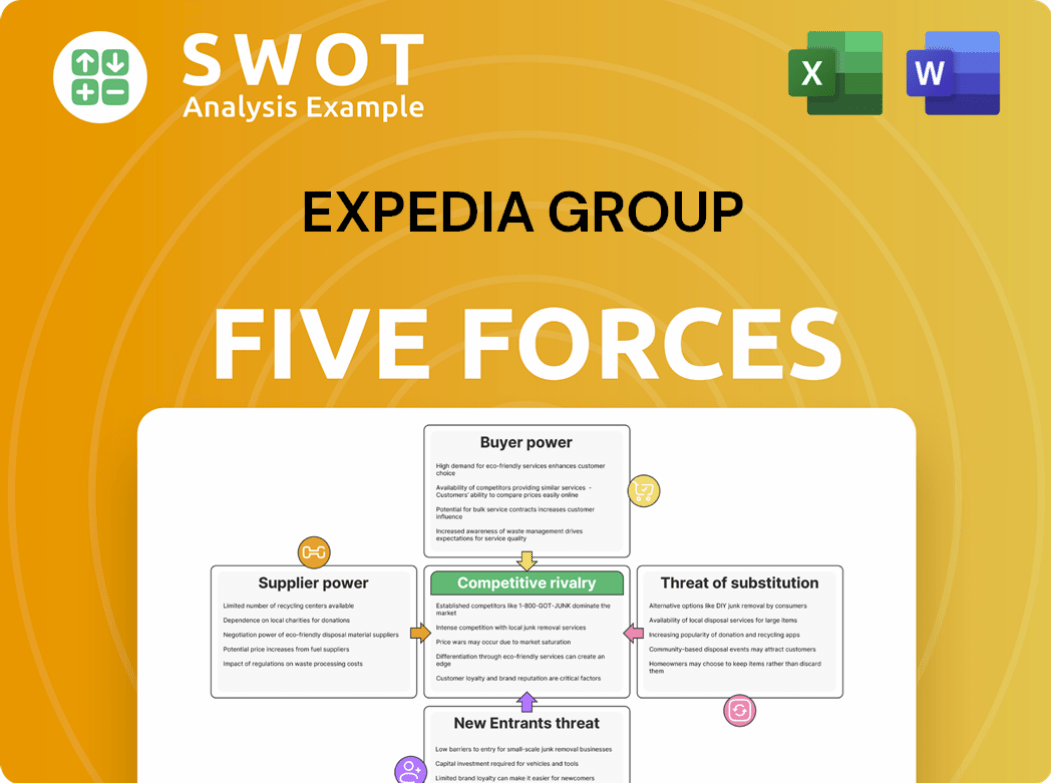
Related Blogs
- What is Competitive Landscape of Expedia Group Company?
- What is Growth Strategy and Future Prospects of Expedia Group Company?
- How Does Expedia Group Company Work?
- What is Sales and Marketing Strategy of Expedia Group Company?
- What is Brief History of Expedia Group Company?
- Who Owns Expedia Group Company?
- What is Customer Demographics and Target Market of Expedia Group Company?
Disclaimer
All information, articles, and product details provided on this website are for general informational and educational purposes only. We do not claim any ownership over, nor do we intend to infringe upon, any trademarks, copyrights, logos, brand names, or other intellectual property mentioned or depicted on this site. Such intellectual property remains the property of its respective owners, and any references here are made solely for identification or informational purposes, without implying any affiliation, endorsement, or partnership.
We make no representations or warranties, express or implied, regarding the accuracy, completeness, or suitability of any content or products presented. Nothing on this website should be construed as legal, tax, investment, financial, medical, or other professional advice. In addition, no part of this site—including articles or product references—constitutes a solicitation, recommendation, endorsement, advertisement, or offer to buy or sell any securities, franchises, or other financial instruments, particularly in jurisdictions where such activity would be unlawful.
All content is of a general nature and may not address the specific circumstances of any individual or entity. It is not a substitute for professional advice or services. Any actions you take based on the information provided here are strictly at your own risk. You accept full responsibility for any decisions or outcomes arising from your use of this website and agree to release us from any liability in connection with your use of, or reliance upon, the content or products found herein.